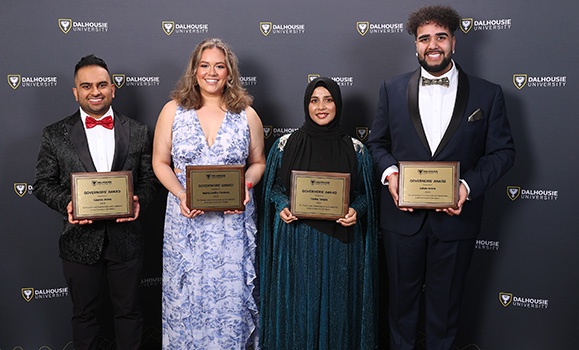The accomplishments of Dalhousie's 2024 Board of Governors' Award recipients illustrate the many ways student leaders can inspire and ignite change.
The winners have stood up for those who have been marginalized. They've pushed for fresh approaches to old problems. They've put their ideas into action, starting societies, launching initiatives, and committing their time and resources to efforts that have enriched the community.
What's particularly exceptional about this year's winners of Dal's top award for student life is that most of them did so, to some extent, under the cloud of a global pandemic. Their first years at Dalhousie were defined by starts and stops, presence and absence, and challenges to connection — making their success in bringing people together and contributing to university life all the more impressive.
This year's four recipients — nominated by their peers in the Dal community, and chosen by a committee consisting of the president, Board members and the vice-provost student affairs — were honoured at this year's Impact Awards in late March.
Meet the 2024 Board of Governors’ Award recipients:
Eshan Arora
Fourth year, BSc in Medical Sciences (Honours)
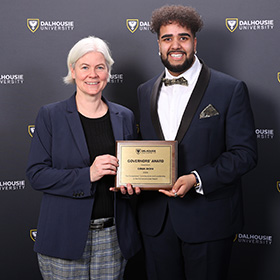 Achieving change can sometimes take a multi-front effort: people pushing from outside of systems for something new or different, alongside others skilled at navigating those systems advocating for change from within.
Achieving change can sometimes take a multi-front effort: people pushing from outside of systems for something new or different, alongside others skilled at navigating those systems advocating for change from within.
In his time at Dalhousie, Halifax-born Eshan Arora has found himself on both sides of that equation. He’s led or helped create new initiatives and societies to support his fellow students and their needs, as well as serving as a voice for students on bodies such as DSU Council and the university’s Board of Governors and Senate.
“I feel like I can use the privilege and power I’ve been able to have in these positions to more fruitfully advocate on the bottom line and inspire and advocate for change,” he says. “And when you connect with other people, you realize you’re not alone in how you’re feeling, and by being able to express and share that, you can really help change things on a foundational level.”
Inclusion is the topic that’s near and dear to Eshan, who is of Indian heritage and speaks four languages (English, Hindi, Spanish and French). His extensive advocacy for and commitment to supporting students from marginalized groups within Dalhousie and beyond was recognized with this year’s President’s Award for the Advancement of Equity, Diversity, Inclusion, and Accessibility (EDIA), in addition to his Governors’ Award.
As program lead of the Dalhousie Science Scholars and Leaders Program (DSSLP) and president & founder of the DSSL Society, Eshan has helped to foster a more supportive environment for underrepresented, diverse students in STEMM studies — working to “demystify,” as he puts it, the unwritten rules and resources of academia through volunteering, community social events, and establishing a place of belonging. He’s been a mentor and tutor to African Nova Scotian cohort students in the Inclusive Pathways to Medical Professions (IPMP) program, as well as an advisor to Dal’s Accessibility in Course Design Task Force, and helped launch a new bursary to address gaps for band-funded Indigenous students. For his capstone project as an inaugural member of the High-Performance Student Leadership Academy, Eshan has been working with the Faculty of Science on a proposal for creating a new Certificate in Science Diversity.
What unites Eshan’s academic studies in Medical Sciences and his extracurricular projects is a passion for helping care and support those in need — a drive inspired, in no small part, by his family. His older brother, now 33, lives with a severe neurological condition from complications cause by childhood meningitis. Eshan, who is 13 years younger than his brother, says the experience of watching and helping his family navigate care informs many of the activities he involves himself with. This includes co-founding the Dalhousie BforKai Chapter. Inspired by the tragic death of Acadia student Kai Matthews, BforKai advocates for meningitis B vaccination and helps educate students and others about the disease and its impacts.
“I wanted to support and spread the awareness of meningitis B specifically with university students, and also to advocate and share my story and try to bring awareness to the lack of support for individuals who are the survivors of meningitis or other illnesses,” says Eshan. At this year’s Impact Awards, the BforKai Chapter was recognized with the Most Impactful Residence Council award.
Dalhousie will get to benefit from Eshan’s leadership for a while yet: he’s been accepted to begin his MD on campus this fall. He’s already well known to many in the Faculty of Medicine, having spent time meeting with faculty and senior leaders to advocate for increased IDD (intellectual or developmental disability) training in undergraduate medical education — again, inspired by his brother’s experience. He expresses gratitude for Dal’s “amazing” faculty, staff and senior administrators who, across his entire time at the university, have been invaluable in supporting his initiatives and outreach.
“All of these initiatives take work and effort, but they’re genuinely what I enjoy doing,” says Eshan. (Ryan McNutt)
Emilia Cordova, Science
Fourth year, BSc in Biology and Chemistry
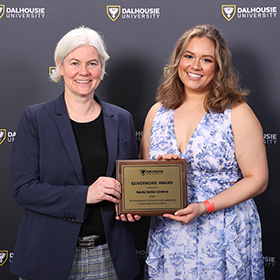 Emilia Cordova remembers feeling a sense of accomplishment but also mixed emotions as she looked out over the crowd at orientation last year thinking, “I would have loved to be a first year this year.”
Emilia Cordova remembers feeling a sense of accomplishment but also mixed emotions as she looked out over the crowd at orientation last year thinking, “I would have loved to be a first year this year.”
Emilia, now in her final year of a Biology and Chemistry degree in the Faculty of Science, started at Dal in September 2020. As an immigrant from Ecuador arriving in a foreign country, her student experience was significantly impacted by COVID-19.
She sought out fellow Latino students to help ease the transition but had trouble finding them.
"I think when you’re an immigrant in a foreign country, you try to find your people,” she says. “It makes you feel like home. You can speak your own language. You can connect with people that know your background. You can relate to them more.”
When campus started to open back up, Emilia thought this would change and that the lively campus she imagined would come to life. When she didn't find quite what she was envisioning, she took matters into her own hands.
She joined the Latino and Hispanics in STEM Society as an executive and started hosting events, such as a Latino trivia night. The gatherings drew in Latino students, but also people from other places interested in learning more about Latino culture.
In her third year, Emilia ran a successful campaign to become vice-president of student life at the Dalhousie Student Union (DSU). She and her team promptly introduced a Multicultural Week where they sourced applications and granted funding to different societies to showcase their culture whether through music, dance, or cuisine. Emilia also championed orientation late-night DJ parties, attracting more than 1,200 students, and led a proposal for sanctioned homecoming activities on campus this year.
Emilia’s impacts inside the classroom are also significant. She is a teaching assistant, tutor in the Chemistry Resource Centre, and is often viewed as a peer advisor by her classmates. With an attentive ear to what her classmates share about their experience, Emilia is eager to share what she has learned about how to navigate university life and resources across campus.
“When I got accepted to Dal, I went to every part of the website. I went through every single tab,” she remembers. “Then being in societies and the DSU gave me access to even more information. I saw friends and classmates that were completely lost, and I like telling them about what's available to them."
Emilia is eagerly looking forward to the summer where she will be researching artificial spider silk protein development. Next fall, Emilia will begin her PhD in Chemistry at McGill. (Tanis Trainor)
Tanha Tanjila, Arts and Social Sciences
First year, Masters of Arts in International Development Studies
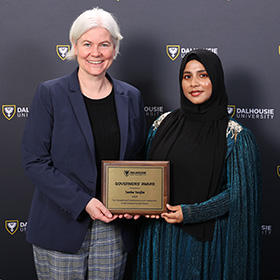 Tanha Tanjila was about a year and a half into her undergraduate degree in finance and business, at a different university, when she felt compelled to make a change. On an exchange year in the U.S. at the time, she signed up for a course on global economics in hopes it would help answer some of the questions bouncing around her brain about inequality.
Tanha Tanjila was about a year and a half into her undergraduate degree in finance and business, at a different university, when she felt compelled to make a change. On an exchange year in the U.S. at the time, she signed up for a course on global economics in hopes it would help answer some of the questions bouncing around her brain about inequality.
It did — and then some. Tanha discovered a passion for a whole new field of study in the endeavor and ended up transferring to Dalhousie to complete her undergrad in International Development Studies (IDS).
“I think that’s the best decision I’ve ever taken in my life,” says Tanha, who is now a master's student in IDS at Dal. “In the last two and a half years of my undergrad, I saw an exponential growth in the way I perceive the world. I wake up every day happy with my studies and what I do because I feel like it’s meaningful.”
Tanha first arrived in Canada from Chittagong, Bangladesh at 19 to study. She took advantage of bridging programs such as Stay Nova Scotia and Dal’s International Student Work Experience program to build connections and develop skills she would eventually parlay into a gig as an English language studies facilitator at Dal and, later, as a language teacher with the Immigrant Services Association of Nova Scotia (ISANS).
When a volunteer from the Canadian youth refugee resettlement organization WUSC spoke to her class one day about volunteer opportunities, a realization dawned on her. “I was like, ‘Oh my, I have so much support and it’s still difficult. Imagine someone who doesn’t even have that kind of support network I’m coming from.’”
She began volunteering with Dalhousie’s WUSC chapter immediately. When COVID hit in 2020, the group went on a bit of hiatus due to international travel restrictions. Members graduated and by the time borders began to re-open, the Dal chapter’s ranks of volunteers had evaporated. Tanha helped the group rebuild, volunteering her time to train people even after she finished her BA in the fall of 2021. Following that, she went on to work for WUSC ‘s national operations, delivering in-person training to university chapters in Ontario.
Back at Dal now, she is still seeing the positive impacts of her work with WUSC.
“I’m a teaching assistant in a class this term, and one of the students is a WUSC student Dal WUSC is sponsoring,” she says. “It was a whole moment, seeing the fruition of my work.”
While Tanha feels confident that Dal’s WUSC chapter is in good hands now, she’s grown increasingly worried about the effects of recent changes to Canada’s immigration and refugee settlement process. Her master’s research explores how these policy shifts are making it more onerous and time consuming for resettlement organizations and private families to sponsor refugees and newcomers.
“More people will not have the capacity to do as they were doing,” she says. “There are 136 sponsorship groups like WUSC in Canada, and almost 10 of them said we don’t have the capacity following the new regulations.”
Her hope is that this research could ultimately help influence policy change. It’s this nexus between research, teaching, and real-world impact where Tanha feels most content, something that was reinforced recently when she was invited to give a guest lecture to Dal undergrads. She plans to start applying to PhD programs later this year.
“After giving that lecture, I feel like this is my calling,” she says. “This is what I want to do.” (Matt Reeder)
Gaurav Arora, Medicine
Third year, Doctor of Medicine
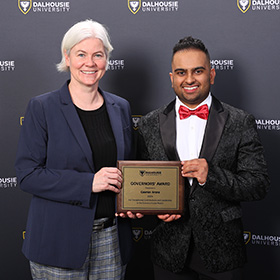 “It used to be who you knew, but now it’s more what information you have access to,” says Gaurav Arora, a third-year medical student at Dal.
“It used to be who you knew, but now it’s more what information you have access to,” says Gaurav Arora, a third-year medical student at Dal.
Opportunities — and the lack thereof — are something Gaurav knew well before arriving at Dalhousie for his undergrad in Biochemistry and Economics in 2013 and again for medical school in 2021. Gaurav’s high school in Amherst, a rural town in Nova Scotia, didn’t have international baccalaureate (IB), advanced placement (AP), or other programs specifically tailored towards high-achieving students headed towards university.
“I noticed in my first year that a lot of people found things easy because they had seen the material before,” he says. “That wasn’t the case for me.”
This prompted Gaurav to seek out and share as much information as he could with others like him. He remembers a message from his induction ceremony — Dal's official welcome ceremony for new students — over a decade ago that stuck with him: Get involved or miss out on all the things that university has to offer.
Motivated by the message, Gaurav took on a variety of roles during his undergraduate studies from volunteer, co-leader, and cast member to committee member, president, co-founder, and mentor. While this community minded work is noteworthy, it is his involvement in the first three years of medical school that have prompted his Board of Governors award now.
Recognizing a lack of opportunities to practice Point of Care Ultrasound (PoCUS) skills outside of the curriculum with medical equipment, Gaurav applied for and received a $5,000 QEII Foundation Grant for Student Initiatives. This funding enabled him to found and lead the Dalhousie PoCUS Club, providing an interactive and hands-on learning experience not previously available and an opportunity for interprofessional collaboration.
“I was also able to collaborate with a group of sonography students who were interested in helping with monthly sessions. Their training is scanning people, so they were able to provide a lot of tips and tricks,” he says.
Gaurav’s passion for medical education and mentorship throughout his time in medical school. He has been instrumental in organizing “Ask an Upper Year Med Student” events. The events assist his classmates and those in earlier years of medical school with transitioning to the next level of their training, whether from pre-clerkship to clerkship or from clerkship to residency.
Together with his team, he has also contributed to the creation of a Clerkship Survival Guide and, most recently, the development of a fourth-year electives guide, designed to assist his peers and students transitioning into clerkship next year.
“Where you have to choose your rotation a year prior, you have no idea what you’re actually getting into, which puts a disadvantage on those who may not know upper-year students or people who’ve gone through medical school,” says Gaurav.
His knack for connecting with others extends to his patient care and advocacy, too.
“I had a patient a couple of weeks ago and their presenting concern was imbalance, weakness and dizziness. On investigation, they had metastatic cancer. I knew that cancer was the big picture concern but made sure that the angle of weakness and immobility was also considered in the plan we made for them."
The desire to help others also shines through in his work with the Halifax Newcomer Clinic, which assists new-to-Canada patients transitioning to Nova Scotia’s health-care system.
Whatever the challenge, Gaurav not only notices disparities in opportunity but takes action to remove them. (Tanis Trainor)

